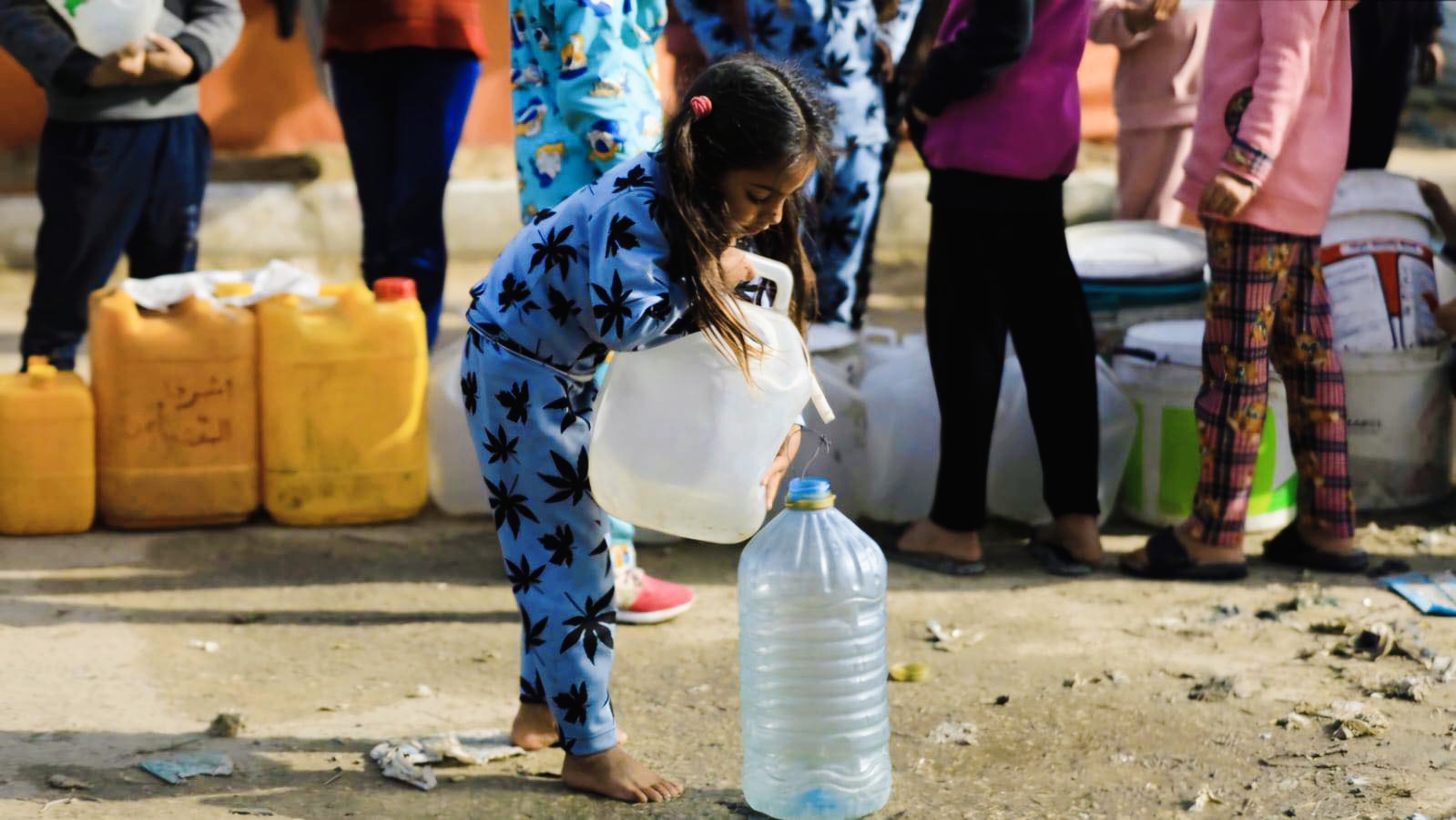In light of the ongoing Israeli war on the Gaza Strip for nearly two years, the humanitarian disaster deepens day by day, as hunger is no longer the only danger threatening the residents of the afflicted area, but thirst has become another face of the crisis, with a significant deterioration in water quality and scarcity of quantities.
In a daily tragic scene, thousands of Palestinians walk long distances through destroyed areas to obtain small amounts of water, used for drinking, hygiene, and cooking.
These arduous journeys barely meet their most basic needs, at a time when global food security indicators suggest that famine is already unfolding in Gaza.
* Contaminated water and deadly salinity
Although some water reaches residents through small desalination units operated by relief organizations, most of the available water is extracted from an aquifer that has become highly saline and filled with pollutants resulting from its mixing with sewage and chemical leaks from the rubble, leading to the widespread outbreak of diseases such as diarrhea and hepatitis.
Israel had halted the pumping of clean water early in the war, which constituted the main source of drinking water in Gaza, exacerbating the crisis, and most of the water and sewage infrastructure has been completely destroyed.
* Scarce electricity and rare fuel
Groundwater pumps often rely on small generators, but the fuel needed to operate them has become almost nonexistent, making it impossible to operate these pumps in many cases.
This near-total collapse of the water system leaves Gaza's residents in a constant struggle to secure their daily needs.
* Stories of daily suffering
Muath Makhamer, a 23-year-old young man who was a university student before the outbreak of the war, walks about a kilometer on foot three times a day to fetch water, waiting in lines that sometimes stretch for two hours to fill two large containers of saline water for cleaning, and two small containers of relatively clean water for drinking.
Muath places his load on a metal hand cart and walks over rough ground back to the family tent that shelters 22 individuals in the Deir al-Balah area.
His mother, Um Muath (53 years old), says: "The children come and go, the weather is hot, thirst is relentless, and we don’t know if we will be able to fill the water again tomorrow."
* Water .. a rare luxury
According to Oxfam, the average daily consumption per person in Gaza does not exceed 3 to 5 liters, while humanitarian policy officer Bushra Khalidi warned that people are dying today from easily preventable diseases, emphasizing the urgent need for an immediate ceasefire and allowing aid to enter without restrictions.
For his part, Danish Malik, the water and sanitation sector official at the Norwegian Refugee Council, said: "Water scarcity is increasing alarmingly, and people are forced to make tragic decisions between drinking or hygiene."
Meanwhile, Munther Salem, the Director General of Water Resources at the Water Authority and Environmental Quality in Gaza, said: "Children have lost their childhood and have become water delivery workers, running after trucks or going to distant areas to get water for their families."
* Endless queues .. and a battle for survival
Water has become part of the battle for survival in Gaza;
Scenes of long queues, pushing, and waiting under a scorching sun have become a common sight, especially in the absence of adequate sewage infrastructure or means to maintain personal hygiene in most of the camps and tents scattered throughout the densely populated area.
Often, the responsibility of collecting water falls on children, while fathers are busy searching for food and other necessities, in a painful distribution of roles amid an endless tragedy.
* The numbers reveal the size of the crisis
The United Nations has set the minimum consumption per person in emergencies at 15 liters per day to meet drinking, cooking, and personal hygiene needs.
But in Gaza, residents do not receive even a third of this figure. In contrast, the average daily water consumption in Israel is about 247 liters per person, according to the Israeli human rights organization B'Tselem.
Between hunger and thirst, the residents of Gaza stand on the edge of life, waiting for some relief .. or perhaps just a drop of clean water!

